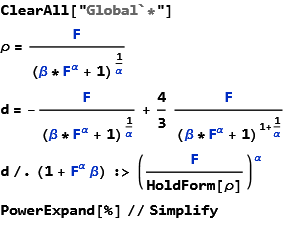So I'm working on a physics problem. I have two functions:
$\rho = \frac{F}{(\beta F^\alpha+1)^\frac{1}{\alpha}}$, $p = - \frac{F}{(\beta F^\alpha+1)^\frac{1}{\alpha}} + \frac{4}{3}\frac{F}{(\beta F^\alpha+1)^{1+\frac{1}{\alpha}}}$
Just by looking at $p$, I can tell it can be algebraically manipulated in order to write it, explicitly, in terms of $\rho$. Indeed:
$p= \frac{\rho}{3}(1-4\beta\rho^\alpha)$
Every math operation I do by hand on this project, I check it on Mathematica just to make sure I don't screw it up. Sometimes I use functions like Simplify or FullSimplify to make my life easier. For example, if I use Simplify[$\rho$], I get a nice reduced expression, and the same for Simplify[$p$]. Nevertheless, I'd love for my program to write $p$ in terms of $\rho$ so I don't have to do it manually as I did above. I'm assuming a way to do this is to tell Mathematica to factor the explicit form of $\rho$ out of $p$, but I'm not sure. Either way, I haven't been able to do this (the factorizing). So far, I've read about the function FactorTerms and even an specific one shown in this answer, but none of this work as I want them to.
I'm assuming a function like this already exists or one may be defined simply, but I just can't figure it out. Any help is appreciated.



